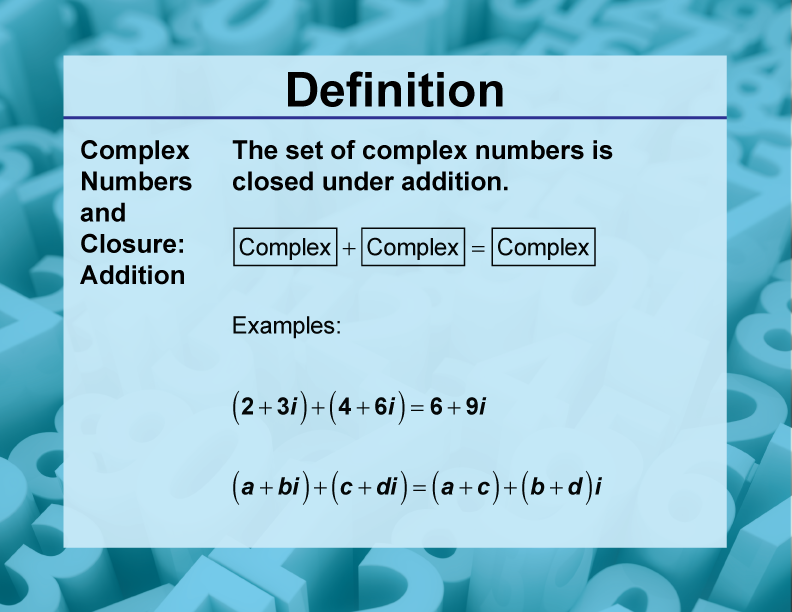
Display Title
Definition--Closure Property Topics--Complex Numbers and Closure: Addition
Display Title
Complex Numbers and Closure: Addition

Topic
Math Properties
Definition
The closure property for addition of complex numbers states that the sum of any two complex numbers is always another complex number. This property ensures that the set of complex numbers is closed under addition, maintaining the integrity of the complex number system.
Description
Complex numbers, represented in the form a + bi where a and b are real numbers and i is the imaginary unit (√-1), form a fundamental mathematical system with wide-ranging applications. The closure property for addition of complex numbers is crucial in establishing the complex number system as a field, which is essential in advanced mathematics and various scientific disciplines.
In the realm of algebra, we can demonstrate this property as follows: Given two complex numbers z₁ = a + bi and z₂ = c + di, their sum is z₁ + z₂ = (a + c) + (b + d)i, which is also a complex number. This algebraic representation shows that adding complex numbers simply involves adding their real and imaginary parts separately, always resulting in another complex number.
The closure of complex numbers under addition has significant real-world applications, particularly in electrical engineering and signal processing. For instance, in alternating current (AC) circuits, complex numbers are used to represent impedance, and the ability to add these complex impedances is crucial for analyzing circuit behavior.
In mathematics education, understanding the closure property for complex number addition helps students grasp the structure and behavior of more abstract number systems. It serves as a stepping stone to more advanced concepts in complex analysis and provides a foundation for understanding other algebraic structures.
Teacher's Script: "Let's add two complex numbers: (3 + 2i) + (4 - 5i). We add the real parts: 3 + 4 = 7, and the imaginary parts: 2i + (-5i) = -3i. So, our result is 7 - 3i, which is indeed another complex number. Can you think of any two complex numbers whose sum wouldn't be a complex number?"
For a complete collection of terms related to the Closure Property click on this link: Closure Property Collection.
| Common Core Standards | CCSS.MATH.CONTENT.HSN.RN.B.3, CCSS.MATH.CONTENT.HSN.CN.A.2 |
|---|---|
| Grade Range | 9 - 12 |
| Curriculum Nodes |
Algebra • The Language of Math • Numerical Expressions |
| Copyright Year | 2021 |
| Keywords | Closure Property |